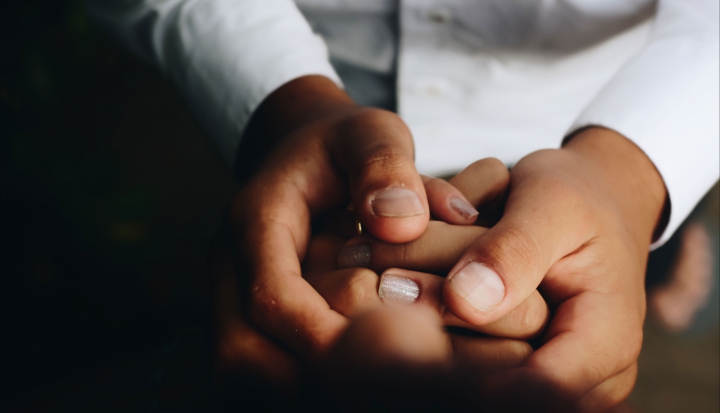Fifty years ago this month, the church restored the permanent diaconate, opening the doors to married clergy who brought and continue to bring with them all the joys, sorrows, and complexities of family life to ordained ministry. In the case of my family, that included first-hand experience with LGBTQ people. In the fall of 2013, at the beginning of our oldest child’s sophomore year at Georgetown University, she came out as trans. With that news, my family found itself plunged into questions and issues that surround families of faith with LGBTQ children, and those who are trans and Catholic.
If there is one truth that has become evident, it is that the reality trans people live is miles from public perception. Ongoing legal battles for the trans community (including over the use of public restrooms) demonstrate how pervasive the misunderstandings and prejudices about gender identity continue to be.
In the case of the church specifically, a series of formal and informal statements has called into question the very existence of trans individuals and has warned about “an ideology of gender,” described as an ideology that seeks to eliminate sexual differences in society, thereby undermining the basis for the family. I respect the theology and the good intentions that underlie these statements, but I think they are based on lack of knowledge and experience and false information about transgender individuals.
My wife and I are cradle Catholics and have large extended families that are predominantly Catholic. Our three children all attended Catholic schools, including Catholic colleges. (One of our daughters remarked recently that she has never set foot inside a public school on a weekday.) After decades of active lay ministry in the church, including various marriage enrichment programs, I was called to the diaconate, was ordained a permanent deacon in 2009, and completed my master’s degree in theology in 2011.
To our dismay, our daughter descended into a deep depression during high school and attempted suicide. Almost overnight we went from the usual parental worries about grades and college applications to just trying to get her through her junior year of high school alive.
My daughter’s depression would eventually lead to her questioning of gender identity. This was intimately connected with her mental health struggles. We now understand that, like many LGBTQ individuals struggling with the decision to come out, she was faced with what seemed like an unsolvable dilemma: Either continue to deny who she really was or come out and risk losing her entire world of family, friends, and faith. This inner battle drove her to consider suicide. The overly simplistic, often negative message about LGBTQ individuals from the church that was so important to her upbringing only served to aggravate that situation.
As for my wife and me, we experienced the full range of thoughts and emotions that any parent does when a son or daughter comes out. There was shock at the news, a lack of understanding of gender issues, internal conflict about what the church teaches about human sexuality, confusion and guilt about what we should do as parents, profound sadness at what felt like the loss of the person who had been our son, and fear and worry for what the future would hold for her. There were arguments, tears, sleepless nights, and prayers—lots of prayers.
Over time we realized that we hadn’t lost the person who had been our son but, when she embraced her gender identity, we got our child back. She emerged from the depths of depression. All of the creativity, humor, empathy, and intelligence that had made her an exceptional person was still there and shining stronger than ever. I’ll never be able to express how grateful and blessed we felt when she graduated from Georgetown University in 2016 and began a career as a graphic artist in Washington, D.C.—all with the support and love of her extended Catholic family.
So when I hear pronouncements about an “ideology of gender,” they simply do not ring true for me. Anyone with any significant first-hand experience with transgender individuals would be baffled by the suggestion that trans people are somehow the result of an ideology. It is a historical fact that long before there were gender studies programs in any university or the phrase gender ideology was ever spoken, trans people were present, recognized, and even valued in some cultures around the world.
Scientists are only just beginning to understand the biological and psychological factors that contribute to gender identity. The only choice that transgender individuals make is whether or not to embrace who they are and live their lives openly as their authentic selves in the face of the rejection, discrimination, bigotry, and even violence that they know they may have to endure.
When my wife and I were forced to educate ourselves about gender identity issues, we found there was no lack of sound, credible information that only reinforced our personal experience. The American Medical Association, the American Psychological Association, the American Psychiatric Association, and the World Professional Association for Transgender Health, who together represent more than 300,000 doctors, psychiatrists, and psychologists, have each affirmed the reality of trans individuals and have issued documents opposing all forms of discrimination against them and providing standards of health care for them. The United Nations has actively opposed the discrimination and violence that trans individuals suffer in many parts of the world. Companies and organizations we all do business with every day—from Apple to Walmart—recognize trans individuals with equal employment opportunity policies and inclusive health insurance.
I share the concerns of all parents for the well-being of their children, including their adult children, concerns that are amplified when an LGBTQ individual is involved. Our prayers and hopes for our daughter are colored by the reality of the discrimination she will likely face for the rest of her life. The probability of being a victim of violence or committing suicide is greater for the LGBTQ community than for the general population, and even greater for the trans community in particular. My family is always a bit on edge when we go out together, worried that unfriendly looks and remarks might escalate to a confrontation or violence. Nobody should have to live that way.
I have found that at the end of the day, what trans individuals want more than anything else is simply to be able to live their lives as who they are, with the same rights, freedom, and dignity that the rest of us enjoy.
My pastoral perspective is informed by the call that all permanent deacons share: to bring the church into the world with all its problems and to bring the problems of the world back to the church.
Well, here’s one such problem: The community of faith includes people who are trans and Catholic, and who are marginalized, unjustly condemned, and suffering simply because of who they are. We as a church need to do some serious self-examination and to take responsibility. I simply cannot believe that our compassionate, loving God wants his children to suffer. I’ve heard warnings about falling into the sin of trying to replace the creator. Are we guilty of that sin when we look at a trans person and have the hubris to deny who God has made? I pray that the church will be open to learning and embracing the truth about transgender individuals who have the same inherent value and dignity as all human beings. Perhaps we all need to have a little more humility and a little more faith in who God has created.
This article also appears in the June 2018 issue of U.S. Catholic (Vol. 83, No. 6, pages 23–24).
Image: Matheus Ferrero on Unsplash













Add comment